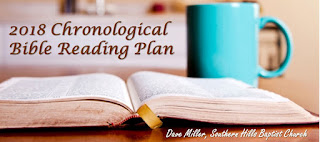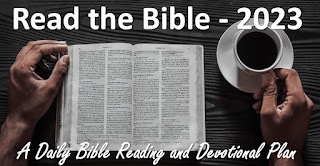"Life is Choices" April 10 Readings: Proverbs 1-4
Today's Reading - Proverbs 1-4
Background
It is often mistakenly assumed that Proverbs is a book without structure. That is largely true from chapter 10 on, but Proverbs 1-9 is organized and detailed - highly structured. After Proverbs 1:1-7, the introduction to the book, there is a series of 10 exhortations, or sermons, on wisdom and folly. The first sermon, in chapter 1, introduces us to the path of wisdom and the path of folly. Then, sermons 2-4, chapters 2-4, are the call of wisdom, telling us why wisdom is better than folly. Chapter 5-7, which contain sermons 5-8 (chapter 6 has two sermons) examines the terrible consequences of folly and tells us what we should avoid that path. Chapters 8 and 9, sermons 9 and 10, are the final appeals to walk in wisdom instead of folly.
Today's reading, after the seven-verse introduction, presents the calls of wisdom and folly and tells us why we should listen to wisdom - why the life of wisdom is so much superior.
Devotional - Life is Choices
The book of Proverbs has its own vocabulary, words that are used in a specific way throughout. But two words form the foundation for the entire book, words found in Proverbs 1:2 and repeatedly thereafter.
For learning wisdom and discipline;for understanding insightful sayings;
The first word is wisdom - hokmah in the Hebrew. For us, wisdom is a mental thing - intelligence, insight, brains. But to the Hebrew, it was a practical word. It meant skill, the ability to do something well. A craftsman who produced beautiful woodwork would be called wise. A musician who plays well would be hokmah. Wisdom is the ability to do something well.
In Proverbs, hokmah is about living life well. It is the ability to live our lives well by honoring God and doing what is right. Wisdom is "skill in living." If you are wise, you live your life the way God commanded and walk in his blessing. Folly, of course, the opposite of wisdom, is rejecting God and going your own way and suffering the consequences.
The second word is "understanding," though I prefer the translation discernment. The Hebrew word, Bijn, is actually a conjunction. "Between." Discernment is "betweening" - the ability to look at a choice and know which one is right.
"Life is choices and choices have consequences." That is the message of Proverbs. Your life is a series of choices that you make. Discernment is the God-given, Word-driven ability to figure out which option is right and which is wrong, which is path of wisdom and which is the path of folly. Wisdom, then, is the ability to choose the right path. Wisdom and discernment work together in Proverbs and in life. You understand right and wrong and discern what the right path is and what the wrong path is and then, with the power of God and wisdom of his Spirit inside, you choose against your sin nature and inborn folly to do what is right. You discern your choices and make the right one.
You get to choose your path but you do not get to choose where that path leads you. If you choose wisdom, it will lead you to God's blessing. If you choose folly, there will be consequences. You will reap what you sow.
Father, may I choose what is right and good, what is wise and best, so that I may see your blessing every day.
Think and Pray
Do you have a knowledge of God's word sufficient to give you discernment when you face choices?Do you choose what is right or what you want?



Comments
Post a Comment